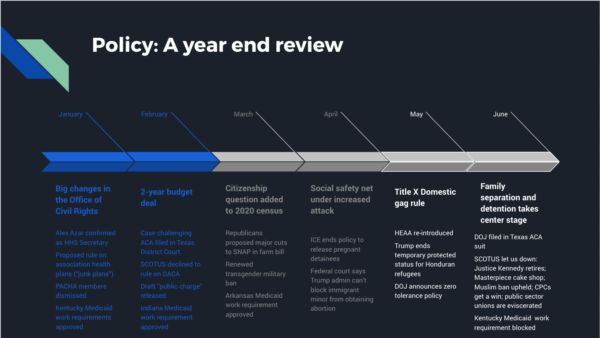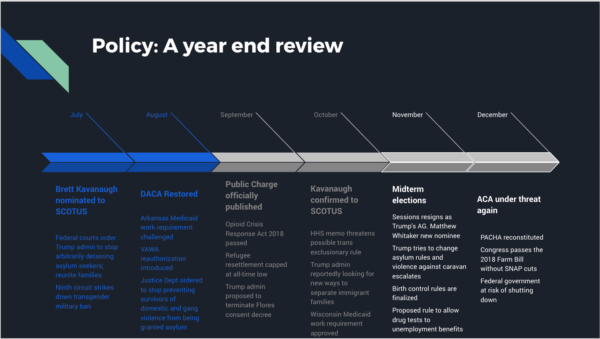
Federal Updates
Trump Administration Updates
The makeup of the Trump administration continues to shift rapidly as Trump appears to struggle to keep key offices filled
December 7, Trump announced proposed nominees for two major positions: William Barr as Attorney General and Heather Nauert as the U.S. Ambassador to the United Nations.
Barr previously served as Attorney General from 1991-93 under George H.W. Bush. He has publicly expressed anti-LGBTQ sentiments, led a fierce campaign to maintain the ban on people living with HIV from entering the United States, oversaw a program that held over ten thousand Haitian asylum seekers in Guantanamo Bay, including holding those living with HIV in indefinite detention, and created the National Criminal Alien Tracking Center, which encouraged local law enforcement to work with federal immigration officials to find undocumented immigrants, or what amounts to the opposite of sanctuary laws.
Nauert is a “Fox & Friends” television personality and, if confirmed, she will be among the least experienced US ambassadors to the UN ever.
Later in December, Trump announced that his current chief of staff, John Kelly, and Interior Secretary, Ryan Zinke, will be leaving the administration before the end of the year. Trump reportedly struggled to find someone to take on the chief of staff role, and was turned down by his top choice, Nick Ayers, and Chris Christie before announcing on October 14 that Mick Mulvaney would be his new chief of staff.
Mulvaney, formerly a Representative for South Carolina in the U.S. House, founded the right-wing, libertarian House Freedom Caucus and has opposed the Affordable Care Act and public funding for abortion.
The Trump administration reconstitutes the Presidential Advisory Council on HIV/AIDS
On December 11, the Secretary of the Department of Health and Human Services, Alex Azar, announced that Carl Schmid and John Wiesman will serve as co-chairs of the recently re-constituted Presidential Advisory Council on HIV/AIDS (PACHA), which is scheduled to hold its first meeting on March 14-15, 2019. PACHA was created in 1995, and the Council has served as an advisory body for the Clinton, Bush, and Obama administrations.
Trump has shown little to no interest in the Council as his administration continues to pursue policies that threaten the health, safety, and security of vulnerable communities. Six PACHA members resigned in June 2017 in protest of the administration’s efforts to undermine the Affordable Care Act and all of the remaining members were fired without explanation in December 2017. The Council has been vacant since.
Federal Budget
The federal government stays open–for now
December 6, Congress passed a two-week continuing resolution to guarantee funding for the federal government and avoid a partial government shutdown until December 21. The resolution is a temporary patch, and Congress will once again face the possibility of a partial government shutdown this Friday.
After a combative meeting between Democratic congressional leaders and Trump on December 11, the prospect of keeping the government open looks bleak. According to Senator Chuck Schumer (D), Trump threw a “temper tantrum,” threatening to block funding for the government if Congressional Democrats don’t include money for a southern border wall in fiscal year 2019.
Congress passes the 2018 Farm Bill without dangerous attacks on nutrition support program
The U.S. Farm Bill is a comprehensive, omnibus bill that governs most federal food and agriculture policy in the U.S. The most expensive, and generally most contentious, aspect of the farm bill has historically been the Supplemental Nutrition Assistance Program (SNAP), a federal anti-hunger program that provides millions of low-income people and families in the US with essential nutrition support via “food stamps”.
This year, Republicans in the House tried to use the Farm Bill to restrict SNAP eligibility and add more stringent work requirements to the program. This could have been devastating, causing millions of people to lose eligibility and exacerbating poverty and food insecurity in rural areas.
On December 10, the House and Senate Agriculture Committees negotiated a final version of the 2018 farm bill that rejected the threatened cuts to SNAP and excluded some of the most dangerous Republican talking points.
The bill isn’t perfect — for example, it does not incorporate changes to improve access for groups that face challenges in participating, like seniors and people with disabilities — but it did nullify some of the gravest threats to SNAP. The bill quickly passed both chambers of Congress, and is now awaiting Trump’s signature.
Reproductive Health, Rights, and Justice
Supreme Court declines to take up two major abortion cases
In a decisive victory for Planned Parenthood and other abortion providers, the U.S. Supreme Court declined to review its first two major abortion cases following Brett Kavanaugh’s contentious confirmation to the Court.
In order for the Supreme Court to take a case (“accept certiorari” in legal lingo), at least four of the nine justices must vote to accept it. Justices Thomas, Alito, and Gorsuch voted to accept the two cases. It is notable that the Court’s other two conservative Justices, Roberts and Kavanaugh, refused to provide the required fourth vote. This could indicate that Roberts and Kavanaugh are wary of taking on the issue of abortion after the September/October confirmation hearings.
The two cases involved the states of Kansas and Louisiana, which tried to ban Planned Parenthood from receiving Medicaid reimbursement for non-abortion reproductive health care services. However, in both states, federal appeals courts said that they could not cut health providers from Medicaid for reasons unrelated to safety, quality and competence of care.
The technical legal issue before the Supreme Court was narrower: whether individual Medicaid recipients have a right to sue when their state disqualifies a healthcare provider from the program. But nevertheless, by not taking up these two cases — Gee v. Planned Parenthood of Gulf Coast and Andersen v. Planned Parenthood of Kansas and Mid-Missouri — the Court allowed court orders stopping states from “defunding” Planned Parenthood to stand.
Trans Rights, Safety and Justice
Courts temporarily block enforcement of transgender military ban
December 10, the Trump administration asked a federal appeals court for permission to discriminate against people of trans experience serving in the military. Trump first announced his plan to ban openly transgender people from US military service on July 2017 via Twitter. The policy was swiftly challenged by LGBTQ advocacy organizations and temporarily blocked by four lower court judges. After the courts intervened, Secretary of Defense, Jim Mattis, issued an implementation plan that clarified the scope and reason for the discriminatory policy change.
The Trump administration is now arguing that the preliminary court order, which is blocking enforcement of the transgender military ban, should be dissolved because the Mattis implementation plan is a “new” policy, rather than an extension of Trump’s original order.
“Secretary Mattis was ordered to implement the President’s ban, and that’s what he did,” said National Center for Lesbian Rights Legal Director Shannon Minter. “Four federal courts have independently concluded that the ban is based on discrimination, not military needs, and that enforcing it would undermine our national security by excluding qualified individuals simply because they are transgender.” Find out more as the case proceeds, here.
Health Care
The Affordable Care Act is under threat again
When the Democratic party won the majority in the US House of Representatives in November, many people thought that President Obama’s signature health care law, the Affordable Care Act (ACA), was finally safe.
Now, however, the ACA is facing a new threat: the courts. On December 14, a federal court judge, Judge Reed O’Connor, in Texas ruled the Affordable Care Act (ACA) unconstitutional. PWN-USA has previously reported on this case in our June and September 2018 Monthly Policy Updates. A group of 18 Republican attorneys general and two governors filed the case in February 2018. In December 2017, Congress passed a tax bill that eliminated the “individual mandate,” a legal requirement that all people have health insurance or pay a penalty.
In 2012, the US Supreme Court upheld the constitutionality of the ACA by interpreting the “individual mandate” as a tax within Congress’s Article I Taxing Powers. Judge O’Connor ruled that when Congress zeroed out the individual mandate, it could no longer be justified under the Taxing Power, and has therefore become unconstitutional. Furthermore, O’Connor held, the individual mandate is “essential to and inseverable from the remainder of the ACA,” so if the individual mandate is unconstitutional, the rest of the ACA falls as well. O’Connor has a history of issuing ultra-conservative rulings, a number of which have been hostile to the LGBTQ community.
The case will almost certainly be appealed to the Fifth Circuit Court of Appeals, a notoriously conservative court that could affirm O’Connor’s ruling and tee up a future Supreme Court challenge. This case has the potential to radically disrupt the U.S. health care system.
However, Democratic states, like California, are preparing to fight for the ACA and nothing has changed for now. The ruling did not include an injunction, meaning that the ACA is still in effect and coverage should not be immediately impacted.
Open enrollment numbers for the Affordable Care Act Marketplace are down, due in part to efforts by the administration to sabotage the ACA
The open enrollment period, during which time anyone can sign up for or change health care plans through the Affordable Care Act (ACA) Marketplace closed on December 15. Enrollment was down, likely reflecting a number of attacks on the ACA by Congress and the Trump administration, such as removing the individual mandate and encouraging the use of “junk health plans” that are cheaper but don’t meet the ACA’s standards.
The Trump administration has also reduced access to essential information about the Marketplace by slashing advertising and outreach funds and even removing training information on best practices for outreach in Latinx communities from the Health Insurance Marketplace website.
Trump administration censors HIV treatment and prevention research
The Trump administration quietly ordered National Institutes of Health (NIH) funded researchers to stop buying fetal tissue this past September, forcibly halting at least one study that aimed to “discover a cure for HIV.” The suspension was first reported in Science in early December. It was not publicly disclosed and, according to the Washington Post, researchers were forbidden from discussing the NIH directive.
In an escalating battle of “scientific censorship of the worst kind,” the Department of Health and Human Services (HHS) also dramatically reduced the normal funding period — from 1 year to 90 days, with the rest “uncertain” — for a leading research facility that relies on fetal tissue research for the development of drugs to treat and prevent HIV. The announcement prompted concerns that HHS will soon cancel the multi-million dollar research contract all together. On December 10, NIH announced its plan to spend up to 20 million dollars on alternatives to fetal tissue research.
Sentencing Reform
The FIRST STEP Act, an imperfect attempt to address problems within the U.S. criminal justice and prison systems, passed the Senate
The FIRST STEP Act, or “Formerly Incarcerated Reenter Society Transformed Safely Transitioning Every Person,” HR 5682, was passed by the Senate by 37 to 12 on Tuesday, December 18. The bill had bipartisan support and passed the House in May with a 360-59 vote. It will now head back to the House, which is expected to approve the Senate’s changes, after which it will head to Trump’s desk. He has indicated he will sign it.
The FIRST STEP Act would achieve modest sentencing and prison reform, like prohibiting the shackling of pregnant people in federal custody, reducing mandatory minimums for select offenses, reduce sentencing disparities between crack and powder cocaine offenses, and expand rehabilitative options for those who are incarcerated.
However, it has come under severe criticism for missed or ignored opportunities to effect genuine change. The bill intentionally excludes immigrants, those who have been convicted of violent crimes, and juveniles sentenced to life without parole from benefiting from the law. Several of the new sentencing provisions in the bill will not apply to people who are currently incarcerated.
The FIRST STEP Act will also likely represent a boon for private prison companies by increasing the use of more electronic monitoring to track and control Black and brown communities that are already disproportionately subject to over policing, surveillance and incarceration.
Instead of developing alternatives to incarceration, this law risks exacerbating historical and institutional bias by adopting risk and needs assessments tools that rely on bias and reinforce systems of oppression. Such tools, which generally use algorithms and demographic data to group incarcerated people in terms of risk, are a part of modern social surveillance that has been called “the newest Jim Crow” and a “digital poorhouse.”
Moreover, there are transparency problems: it is not clear what data and factors will be used by the risk assessment system or whether administrators have discretion in implementing the tool’s recommendations.
Election Updates
Republicans pass legislation to undermine ability of incoming Democrats to govern
Republican legislators in Wisconsin and Michigan have initiated a “legislative coup” to sabotage the leadership changes that voters demanded in November. In both states, Democrats won races for
Governor and Attorney General but failed to win control of the state legislatures due in part to highly gerrymandered legislative districts. Republicans in the state legislatures responded by using a lame-duck session to pass bills that would limit the power of incoming Democratic officials.
They are going further than diluting Democratic control. In Wisconsin, Republicans also passed bills to expand their own legislative authority and to limit early voting. The Michigan Senate passed bills to weaken two citizen-led, economic justice measures (one that raised the minimum wage and another that required paid sick time for employees) and to water down two ballot initiatives (one establishing an independent redistricting commission and one expanding voting access).
State Updates
California
In late November the state attorney general, Xavier Becerra, approved a hospital merger that could put women and LGBTQ folks seeking medical care at risk. Becerra signed off on the merger of Dignity Health, which has 39 hospitals in 3 states, and Catholic Health Initiative (CHI), which has 103 hospitals in 18 states. The merger will create CommonSpirit, the single largest nonprofit health system in the nation.
This is troubling because Dignity Health hospitals have already refused patients services, like tubal ligations and gender confirmation care, under the guise of following “Ethical and Religious Directives” from the Catholic church. (CHI does not have a spotless record either–it was given 10 points out of 100 for its treatment of LGBTQ patients by Human Rights Campaign’s 2018 Healthcare Equality Index.) The approval included some safeguards to protect access to reproductive health care, like a nondiscrimination clause based on gender identity and sexual orientation.
CommonSpirit committed to supporting housing and other services for homeless patients and to offering a 100% discount to patients at 250% of the federal poverty line. It will also maintain its current levels of reproductive health and emergency care for at least 5 years.
Georgia
Republican Brad Raffensperger was declared the winner of Georgia’s secretary of state race in a runoff election. He will replace Brian Kemp, who won the state’s gubernatorial election amid accusations of widespread voter suppression tactics. Stacey Abrams, Kemp’s challenger in the gubernatorial election, will continue her lawsuit aimed at overhauling the Georgia electoral system.
Idaho
A federal judge in Idaho ordered the state Department of Corrections to stop denying prisoners of trans experience gender confirmation surgery. The state refused to provide Adree Edmo, a Native American woman of trans experience, necessary medical care and in doing so, violated Edmo’s Eighth Amendment right to be free from cruel and unusual punishment.
This ruling puts Idaho in line with several other federal courts, including in Missouri, Florida and New York, who defend the rights of people to trans experience to access necessary medical care in prison.
Louisiana
Kyle Ardoin, a Republican, won the Louisiana Secretary of State race in a special election after the previous secretary of state stepped down in the wake of a sexual harassment lawsuit. Ardoin defeated Democratic-challenger Gwen Collins-Greenup.
North Carolina
North Carolina Democratic candidate Dan McCready withdrew his concession in a congressional race that was marred by evidence of voter fraud. McCready’s decision followed the North Carolina board of elections’ refused to certify midterm election results in his district, the 9th Congressional District, because of absentee ballot irregularities. Someone involved with the Republican candidate’s campaign, Mark Harris, allegedly tabulated votes early to do last-minute voter turnout planning and harvested over 800 ballots. The race is still not certified, and it is currently unclear whether there will be a second election.
A look at everything we’ve survived in 2018! Our Year-End Review.




